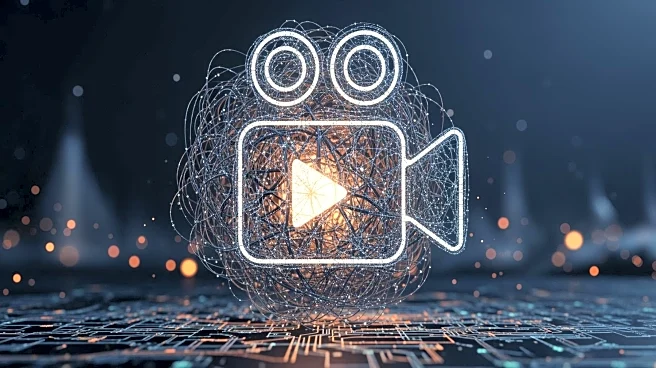What's Happening?
OpenAI's Sora app, which generates videos using artificial intelligence, is gaining popularity on social media platforms like TikTok and Instagram. The app allows users to create videos with short text
prompts, leading to a surge in AI-generated content that blurs the line between reality and fiction. Despite being invite-only, Sora is topping app download charts, and its impact is felt even by those who don't use the app. Concerns are rising over the app's potential to create nonconsensual deepfakes, as users can make 'cameos' of others, including famous personalities and ordinary individuals, without explicit consent. OpenAI has implemented guardrails to prevent unsafe content, but the app's ability to manipulate likenesses raises ethical and privacy issues.
Why It's Important?
The proliferation of AI-generated videos through apps like Sora poses significant challenges to digital literacy and trust in online content. As AI tools become more accessible, the potential for misuse increases, leading to confusion and erosion of truth. This is particularly concerning for vulnerable groups who may face harassment or reputational damage from deepfakes. The app's ability to create realistic videos of individuals without their consent highlights the need for stronger regulations and ethical guidelines in AI technology. The impact on society includes potential harm to democracy, as deepfakes can be used to deny reality and manipulate public perception.
What's Next?
OpenAI faces the challenge of balancing innovation with ethical responsibility. As Sora continues to grow, the company may need to enhance its guardrails and consent mechanisms to protect users from nonconsensual deepfakes. Stakeholders, including policymakers and digital rights advocates, are likely to push for stricter regulations on AI-generated content to safeguard privacy and prevent misuse. The ongoing debate over AI ethics and regulation will shape the future of such technologies, influencing how they are integrated into social media and other platforms.
Beyond the Headlines
The rise of AI-generated videos like those from Sora could lead to long-term shifts in how society perceives digital content. As the line between real and artificial blurs, individuals may become more skeptical of online information, impacting trust in media and communication. The cultural implications include a reevaluation of authenticity and the role of technology in shaping narratives. Legal frameworks may need to evolve to address the complexities of AI-generated content, ensuring protection against misuse while fostering innovation.











